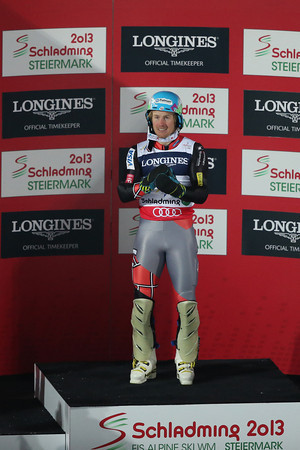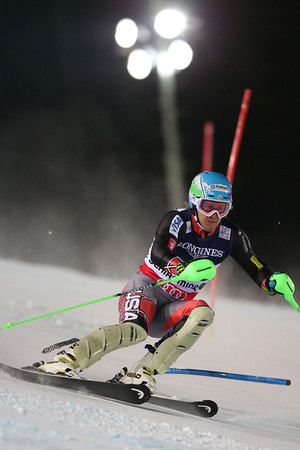The last time Ted Ligety won what in alpine ski racing is now called the super-combined event -- a race with downhill and slalom events -- was so long ago it was simply called the combined. Seven long years.
That was the Torino 2006 Winter Olympics.
He came through again Monday, and again on the big stage, at skiing's 2013 world championships in Schladming, Austria.
Truthfully, Ligety didn't just win, he dominated. The daylight downhill run left him standing sixth, in solid position to attack. Then, under the lights at night, he executed a slalom run that was both on-edge and safe to win it all by a whopping 1.15 seconds over Ivica Kostelic of Croatia. Austria's Romed Baumann finished another two-hundredths behind for third.
Ligety's total winning time: 2 minutes, 56.96 seconds. The downhill portion: 2:02.10; the slalom, 54.86 seconds.
Ligety's victory marked his second title at the 2013 worlds. He won the super-G last Friday.
Neither is considered his best event. That would be the giant slalom, which will be run this coming Friday. Ligety is widely viewed as the favorite in that event, having won four of five giant slalom races on the World Cup tour this season. He is a three-time World Cup giant slalom season champion.
Obviously, Ligety is on a huge confidence and momentum roll, the kind that sets you up to be -- at least on the men's side -- The Face of the U.S. Ski Team at the 2014 Winter Olympics in Sochi.
Which, frankly, is at it should be.
That's no disrespect to any of the other guys on the U.S. team, in particular Bode Miller, who is taking this year off to let a knee heal. None whatsoever. If Bode comes back strong, all's the better. No one -- that's no one in the world, not just anyone in the United States -- has Bode's on-ski style and verve.
That said, Ligety is no longer the 21-year-old surprise of the 2006 Torino Games.
Sochi would be Ligety's third Olympics, and he is by now a team leader and proven big-time competitor. Now, too, Ligety is world champion in three different events -- giant slalom at Garmisch-Partenkirchen, Germany, in 2011, and super-G and super-combined in 2013. Ligety also won bronze in the giant slalom at the world championships at Val d'Isere, France, in 2009.
Plus, in Sochi, Ligety would have something to prove, believe it or not.
His gold in the combined in Torino is his only Olympic medal. He was shut out in Vancouver in 2010.
Miller is a multiple Olympic medalist, in Vancouver and in Salt Lake City in 2002, and at the worlds did what Ligety has now done -- win two golds at the same world championships. He did it twice, in fact, in Bormio, Italy, in 2005 (downhill and super-G) and St. Moritz, Switzerland, in 2003 (giant slalom and combined).
That kind of range marks you as a great all-around skier.
Ligety has never -- again, never -- wanted to be considered as a guy who only skis the giant slalom.
"I never wanted to be a specialist," Ligety said Monday, adding a moment later, "To have three world championships in three different events is pretty surreal -- it's a pretty cool feeling."
When Miller won his combined titles, and when Ligety won the combined at the Olympics in 2006, the combined was one downhill and two slaloms. Now the super-combined is one downhill and one slalom.
The way Ligety positioned himself to win Monday speaks volumes about his maturity and race savvy.
Ligety said he had been puzzling over how to best ski the downhill. It wasn't so much that the mountain was so treacherous. In fact, it was comparatively easy. The challenge was finding speed -- meaning the right line.
In the race itself, he figured it out, finishing sixth. There are times when sixth can, as Ligety later called it, prove "awesome." This was one of those times, because he was less than a second out of first, behind Austria's Baumann, Norway's Aksel Lund Svindal, Italy's Christof Innerhofer, France's Adrien Theaux and another Italian, Dominik Paris -- guys who, with the exception of Svindal, are generally more known for speed than technical slalom skill.
Ligety's concern, as he explained after the downhill, was Kostelic, in 10th, and Austria's Benjamin Raich, in 12th.
Svindal, Innerhofer and Theaux all failed to finish the slalom. Raich went out, too. Paris would finish ninth.
Kostelic ran before Ligety, taking the lead -- but, in skiing the night leg in 55.36 seconds, gave Ligety a huge opening. It's not that Kostelic was particularly slow. It's just that he could have been faster. Which Ligety knew.
"I just tried to ski as smart as I can," Ligety said moments after skiing the field's second-fastest run of the night, that 54.86, pumping his fists after crossing the finish line, knowing he had the race won. "I'm not always that smart in slalom. I just tried to have a solid run the whole way down and not try to make too many mistakes.
"To see the green light at the bottom," meaning first place,"was a really sweet feeling."



